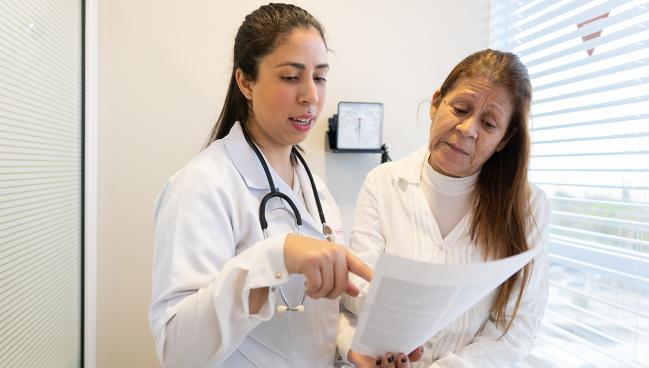CVD Risks Vary by Type of Menopausal Hormone Replacement Therapy
Venous thromboembolism is a risk with several contemporary HRT formulations, consistent with earlier data.

Several contemporary formulations of hormone therapy administered during the menopausal transition carry some degree of cardiovascular risk, Swedish registry data affirm.
Most consistent was an increased likelihood of venous thromboembolism (VTE), which was observed with oral continuous estrogen-progestin therapy, oral estrogen-progestin sequential therapy, oral estrogen alone, and transdermal combined therapy (HRs 1.46 to 2.00), researchers led by Therese Johansson, PhD (KTH Royal Institute of Technology, Stockholm, Sweden), report in a study published online recently the BMJ.
Certain types of hormone replacement therapy also were associated with greater risks of overall CVD, ischemic heart disease, cerebral infarction, and MI.
“These findings highlight the diverse effects of different hormone combinations and administration methods on the risk of cardiovascular disease,” Johansson et al write.
Earlier observational analyses, such as those from the Nurses’ Health Study in the United States and the General Practice Research Database in the United Kingdom, indicated potential cardiovascular benefits associated with the use of hormone therapy in postmenopausal women. But randomized trials, including HERS and the Women’s Health Initiative, didn’t bear that out and, in fact, showed that hormone therapy increased various cardiovascular outcomes.
“These trials challenged the initial positive outlook inspired by observational studies and altered our comprehension of the complexities and associated risks of menopausal hormone therapy, prompting a critical reassessment of its usage,” Johansson et al note.
In the two decades that have passed since those trials were conducted, new hormone therapy products have entered the market, highlighting the need for a more contemporary look at the potential impact on cardiovascular risk.
The current study, the authors say, “was specifically designed to avoid selection bias commonly seen in observational studies by emulating a target trial and to overcome the limitations of randomized trials by examining various types of menopausal hormone therapy products.”
The analysis included Swedish national healthcare registry data on 919,614 healthy women ages 50 to 58, the typical age for the menopausal transition, between 2007 and 2020 who had not used hormone therapy in the prior 2 years. The investigators designed 138 nested trials, with one starting each month from July 2007 to December 2018, to compare women who had not initiated hormone therapy with those who were prescribed any of seven regimens: oral combined (estrogen plus progestin) continuous, oral combined sequential, oral unopposed estrogen, oral estrogen combined with the levonorgestrel intrauterine system, tibolone, transdermal combined, and transdermal unopposed estrogen.
Combining all emulated trials together, 77,512 women (mean age 53.0 years) started hormone therapy and 842,102 (mean age 53.9 years) did not. Overall, 24,089 women had a cardiovascular disease event (VTE, ischemic heart disease, cerebral infarction, or MI) through 2 years of follow-up. The most common type of event was ischemic heart disease (43.0%), followed by VTE (38.2%), MI (17.9%), and cerebral infarction (17.0%).
When comparing initiators with noninitiators, overall CVD risk was greater only with tibolone (HR 1.52; 95% CI 1.11-2.08), an agent that is not approved for use in the US. Risk of ischemic heart disease was higher with both tibolone (HR 1.46; 95% CI 1.00-2.14) and oral estrogen-progestin (HR 1.21; 95% CI 1.00-1.46), and VTE risk was greater with oral combined continuous therapy (HR 1.61; 95% CI 1.35-1.92), oral combined sequential therapy (HR 2.00; 95% CI 1.61-2.49), oral estrogen-only therapy (HR 1.57; 95% CI 1.02-2.44), and transdermal combined therapy (HR 1.46; 95% CI 1.09-1.95).
None of the regimens were associated with an elevated risk of either cerebral infarction or MI when comparing women who did versus did not start therapy.
In a per-protocol analysis that examined the impact of continuous users versus those who never used hormone therapy, tibolone was associated with greater risks of overall CVD (HR 1.81; 95% CI 1.25-2.61), cerebral infarction (HR 1.97; 95% CI 1.02-3.78), MI (HR 1.94; 95% CI 1.01-3.73), and ischemic heart disease (HR 1.76; 95% CI 1.14-2.70), but not VTE. Oral combined continuous therapy was tied to higher risks of overall CVD (HR 1.22; 95% CI 1.00-1.50) and ischemic heart disease (HR 1.27; 95% CI 1.01-1.60).
Several regimens remained associated with a greater risk of VTE.
“I am really glad that this study is out,” commented Leslie Cho, MD (Cleveland Clinic, OH), lead author of a review article spearheaded by the American College of Cardiology’s Cardiovascular Disease in Women Committee published last year that discussed a rethinking of menopausal hormone therapy.
“The reason why we published that paper was because we noticed a trend where there has been an increased use of hormone replacement therapy. There is this sort of notion that’s been pushed by celebrities that somehow we are depriving women of this life-giving therapy,” she told TCTMD. The accumulated evidence indicates, however, “that these are not benign therapies,” she added.
This large, real-world dataset out of Sweden affirms that, showing a greater risk of VTE in particular across formulations, Cho said. “For all these compounds, while they can be used safely in many women, you still have to make sure that [for] women who are at risk for venous thromboembolism and for CAD and stroke, that we really talk to them about it.”
Women with overweight, for instance, have a sixfold increase in deep venous thrombosis when taking hormone replacement therapy, Cho highlighted. “This resurgence of hormone replacement therapy for postmenopausal women really needs to be well thought out by clinicians,” she said.
Cho pointed out that several professional societies—including the American College of Obstetricians and Gynecologists, the American Association of Clinical Endocrinology, the Endocrine Society, and the North American Menopause Society—have issued guidance on hormone replacement therapy, recommending its use for the shortest amount of time need to treat postmenopausal symptoms.
“That’s the only indication for these drugs,” she said, adding that they should not be used for prevention of cardiovascular disease.
Todd Neale is the Associate News Editor for TCTMD and a Senior Medical Journalist. He got his start in journalism at …
Read Full BioSources
Johansson T, Karlsson T, Bliuc D, et al. Contemporary menopausal hormone therapy and risk of cardiovascular disease: Swedish nationwide register based emulated target trial. BMJ. 2024;387:e078784.
Disclosures
- The study was primarily funded by the Swedish Brain Foundation and the FGS Fang Foundation (administrated by the Swedish Brain Foundation), with additional funding from the Swedish Heart Lung Foundation, the Swedish Research Council, and the Uppsala University centre for Women's Mental Health during the Reproductive Lifespan (WOMHER).
- Johansson reports no relevant conflicts of interest.





Comments